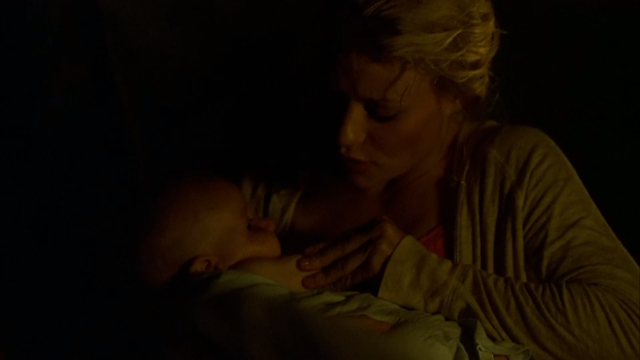There are two screenwriting techniques that have passed into legend at this point: Save The Cat and Ticking Clock. The former involves putting in a scene as early as possible that shows the protagonist risking their personal safety to help a vulnerable person in order to make them immediately likable to the audience. The Ticking Clock is a time limit thrown into the narrative to create thrills; Michael Moorcock advised that one use the concept in adventure fiction as a matter of discipline. In contemplating an episode of LOST, I have come with a new idea that effectively combines the two: the Sick Baby. In season two’s “Maternity Leave”, Claire is distraught to find her baby has come down with a fever, and she decides to deal with it by beating her amnesia, which gives her visions of a bunker out in the jungle where she can find medicine. What’s interesting about this is not only does she fail – the bunker has been completely cleared of medicine – it also turns out that she didn’t need to leave in the first place, because her baby gets better completely on his own. But it still works because it was both the jumping off and culmination of a story. Claire’s story started with her being a reluctant mother, and the fact that she’s willing to march off into the Jungle O’ Mystery is a sign of how far she’s traveled along her journey. What interests me most, though, is that it’s a deeply and immediately sympathetic motivation to kick off a story.
Reduce this plot to its essential salts, and you have a clear problem that demands an immediate solution – a sick baby on an island with no medicine – with the protagonist grabbing onto one that’s just good enough to plausibly work but just imperfect enough to create tension. This leads her to do things that force other characters to act – Kate is not just gonna let Claire run off alone – and spill out even further into the narrative, causing her, her friends, and the viewer to learn new things about themselves and the island that come into play later in the show. The thing is, quite a few plots on LOST work exactly like this, all the way back to the pilot. A plane has crashed, leaving many people dead or injured, so we have to call for help, and we do that by going out and finding the plane’s transceiver in the cockpit, which of course leads to characters committing acts that reverberate through the whole rest of the show, even when it just involves them bonding through shared experiences. An easy mistake to make is to believe that a character has to succeed at their goal for the plot to mean something, but I think it’s more accurate to say that a plot is meaningful when a character commits an action, sees the consequences for that action, and comes to a conclusion that makes sense even when it’s morally repugnant or even technically incorrect.
A Sick Baby situation allows for the generation of a plot like that. One begins with a situation that demands some kind of immediate response – playing off the Save The Cat mentality, some kind of threat to innocent life would be the most accessible – and then our protagonist is the one to act upon repairing that situation, and the writer can then generate consequences from that action. A better Sick Baby has a clear Ticking Clock attached to it; our eponymous example doesn’t have something like “you have 48 hours” attached to it, but we do understand that our time is limited to a few days at best. The best Sick Baby, of course, has a clear and decisive action attached to it; a sick baby needs medicine, and in this case the ambiguity comes in both whether or not Claire’s situation will actually result in medicine at all, and whether or not she’s risking life and limb for a situation that’s not as bad as she thinks it is. Part of what motivated this whole line of thinking of contemplating Gears Of War and realising that, for a game that’s about a hopeless war in which we’ve been pushed to the edge of the world and forced into last-ditch efforts, there’s no actual urgency, which comes from the lack of specific problems that require specific solutions.
The first game is based around delivering a device called a resonator into the heart of the Locust tunnels, and while I understand the reason behind it – it can map the tunnels so that a missile can be sent in at a weak point – I struggle to care. I’m told that this is vital to the war effort and that this is a desperate effort of people who are completely out of options, but I don’t feel it. I can see some of the sense behind that – writing a coherent story is hard, and you might find yourself struggling to justify why an army is sending four guys with guns in to solve such a crucial problem when that’s your story’s whole raisin de entree – but it creates a sludgy atmosphere in which we are buffeted about by the forces of the universe, which admittedly can be its own pleasure (it certainly describes a lot of comedies I love) but saps the story of any real tension. A Sick Baby motivation immediately sets the tone to ‘thrilling’, and a good dramatist can build on that.

